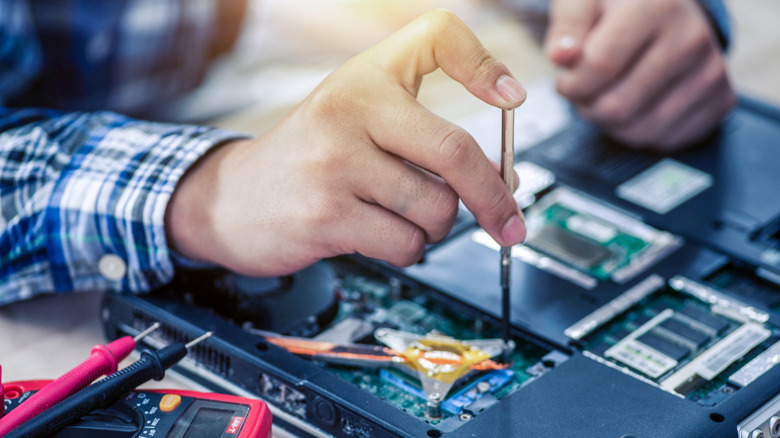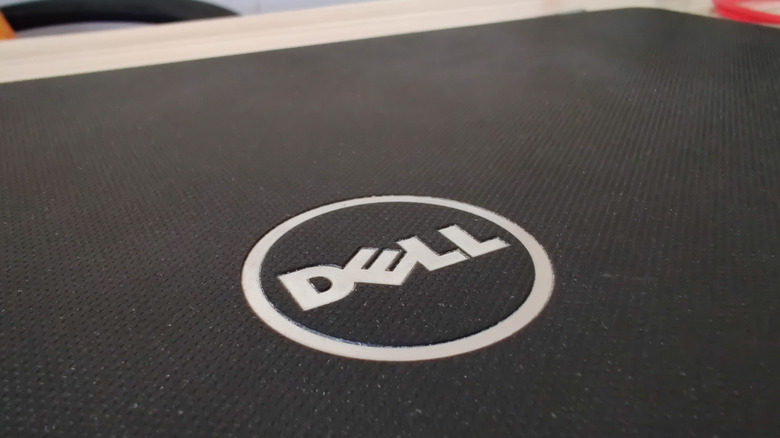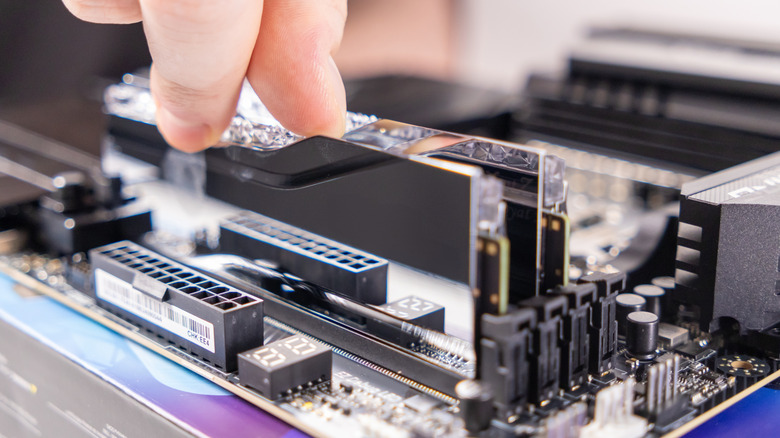Can You Upgrade The CPU On A Laptop? Here's What You Need To Know
Laptops are popular for a variety of reasons, including their convenience and portability. However, that convenience comes at a price. If you want to upgrade an individual component of your laptop, such as the CPU, you'll typically face an uphill battle due to how modern laptops are designed. Consumers like small and portable laptops, giving manufacturers some strict size constraints to keep their buyers happy.
To keep form factors compact, manufacturers rely on proprietary or non-standard internal components and solder them to the motherboard. Major computer brands used to design their laptops with customization in mind, but that has changed in recent years. Now none of the major laptop manufacturers, including Dell, Alienware, HP, Acer, Asus, allow it. As a result, it's rare to find a laptop that will allow you to upgrade its CPU. Instead, you typically have to upgrade to a more high-powered laptop, replacing your old one completely.
Luckily, if being able to upgrade components is a key factor in your choice of laptop, a few brands out there still allow users to do so. However, upgrading your laptop's CPU isn't the only way to improve performance; users have plenty of other options to explore. In fact, a CPU could be one PC upgrade that's really a waste of money.
Find the brands that allow for customization
Reliable laptop brands like Dell and Asus lock you into keeping their laptops until you absolutely need a new one. While that's fine for an everyday user who doesn't know the difference between a CPU and GPU and doesn't much care, it's a frustrating matter for the tech savvy. There are a few lesser-known brands that offer laptops with a modular design, including Framework and Eurocom. Both manufacturers build modular laptops that allow for upgrading everything from the processor to the memory. Framework makes upgrading a CPU easy enough that it can be done within 15 minutes.
The company also takes the modular idea literally, using an expansion card system that lets users choose the ports they want and where they want them on the laptop. Eurocom's laptops are built with socketed CPUs – the same that are used in a desktop computer. While getting to the processor is a little different with a laptop, the process of installing one is almost identical. Going with a brand that makes upgradeable laptops will save money in the long run since buying individual components is cheaper than a whole laptop, but it's not as easy as walking into your local Best Buy to get one of those brands.
You don't need to upgrade a CPU to improve performance
For anyone who owns a laptop that makes it impossible to upgrade its processor, there are other methods for improving the laptop's performance. While the processor is vital for many tasks, it's not the only component that makes a difference. You can focus on components that can be upgraded, including memory. RAM affects your computer's performance in a big way, making video and photo editing programs run smoother. If video editing isn't your thing, more RAM, especially at a higher clock speed, means near unlimited browser tabs can be open without so much as a hiccup from the computer.
Moreover, ignoring driver updates can cause serious performance issues. If you have any missing drivers in Windows 11, it's best to get them downloaded and installed promptly because the issues can stack up. Regularly check for driver updates. Using Windows Update is a reliable method to see if drivers are up to date. Something to consider before buying a new laptop is the CPU's generation because both AMD and Intel typically roll out new iterations of their processors every year. Knowing the newest generation can land you with the most powerful laptop processor while also preventing you from buying an outdated laptop, thus not needing to upgrade the processor for a good while.
Unless you need the mobility and convenience a laptop provides, a desktop is a more suitable computer.


